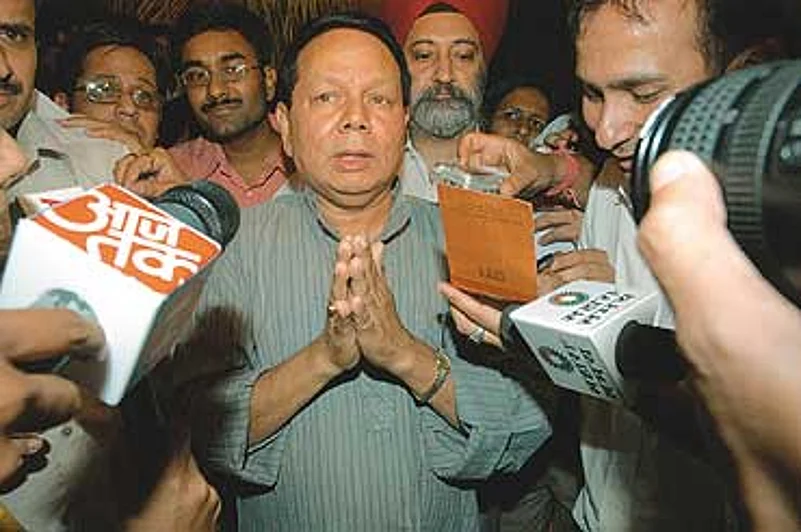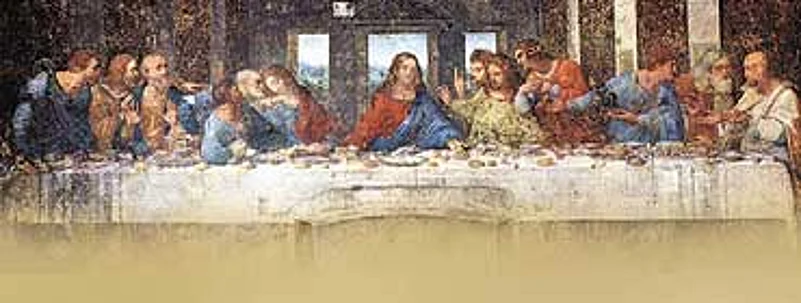- The mystery thriller's central hypothesis, that Jesus Christ married Mary Magdalene, and fathered a child, giving rise to a prominent family line still present in Europe today
- The claim that Jesus was not resurrected because he didn't, in fact, die on the cross; that he was viewed as a man, and not as a God, up until the 4th century, when he was deified by the emperor Constantine
- The depiction of the Catholic Church as having engineered a 2,000-year conspiracy to cover up what "really" happened to Jesus in order to keep itself in power, even resorting to assassinating his descendants
- The portrayal of Opus Dei as a secretive and violent cult that stops at nothing, not even murder, to suppress the "truth" about Jesus Christ. Opus Dei is a conservative Roman Catholic group closely associated with the Catholic Church.
***
"You can't fictionalise a religious figure. Tempers are high and there's no saying what may happen when it is released."
Joseph Dias of Catholic Secular Forum
"Christians need not see it. It was written by a Christian, and filmed by a Christian and the West hasn't banned it."
Susan Carol Lobo, Professor, Mumbai
"Our faith is a fact, not fiction. Therefore, we should take this outrageous fictional creation in our stride."
Dr Stanley Roman, the Bishop of Kollam, Kerala
"The Christians are tolerant and not adamant. We can rethink our position within a democratic framework."
Father Donald D'Souza of the Catholic Bishops' Conference of India
***

Finally, it was the green signal from a group of Catholic leaders that settled the matter. The group that saw the film with Dasmunshi, which included Dr Donald D'Souza of the Catholic Bishops Conference of India (CBCI), Bishop Anil Couto of the Delhi Catholic Archdiocese, Father John Noronha of Caritas India and Dr Valson Thampu of the National Integration Council among others, went along with the release of the film. "What we said was that the story is not acceptable to the Christian community of India. It doesn't reflect facts of Christianity. If the government wants to release the film, it should be accompanied with a bold and lingering disclaimer lasting at least 15 seconds for it to be internalised by the viewers," said Dr D'Souza.
The group pointed out certain scenes to the censor board which they felt were not in "good taste". Like one where the character Silas makes the sign of a cross before and after a murder. However, the censor board, having seen the film, has not recommended any cuts in the film.
Now, though the decks will start clearing for the film, it will still not be logistically possible for Sony Pictures to release it in India until next week. Moreover, legally, the fate of the film is still uncertain. The Bombay High Court has issued notices to the censor board and Sony Pictures Ltd asking them to respond to a petition filed by Joseph Dias of the Catholic Secular Forum (CSF), which led the initial demand for a ban on the film.

Meanwhile, a heterogeneity of Christian voices has emerged over the last week. While theCSF threatened to fast until death on the issue, Nicholas Almeida, a former Bombay corporator, even declared a prize money of Rs 11 lakh for Dan Brown's head. In Kerala, with a 20 per cent Christian population, the response was muted, but the Goa government, with a bigger Christian population to worry about, sought a ban on the film. Capt E.G. Viegas, president, Goa Catholic Association, said, "The screening of the movie in Goan theatres is likely to create communal disturbance and hatred within the community, based on religious lines."
On the other hand, there were bodies like the Delhi Catholic Archdiocese (DCA), which vehemently opposed the ban. "Dan Brown has structured the book mischievously, mixing facts with fiction, using real, historical people and creating confusion. We protest against such a representation but we do not ask for a ban. Let people watch the film and decide for themselves," said Father Dominic Imanuel of theDCA.
Similarly, the moderate Bombay Catholic Sabha also found the book and film offensive but stopped short of demanding a ban. Sabha president Dolphy D'Souza cautioned that extremist methods of protest could land the community in trouble: "If we use extreme and violent methods, we will be like the Bajrang Dal or the Taliban. We are not that at all," said D'souza.
In fact, much of the credit for the eventual resolution of the issue should go to liberal Christian voices. Apart from being open-minded, they were pragmatic enough to realise it was foolish to give so much publicity to a film that has actually been a damp squib. "It has had a poor reception. Any controversy will only help it sell more. It's best to ignore it," said Father Imanuel. "It is just a Hollywood thriller and not a very good one at that," said Dr D'Souza ofCBCI, after seeing the film.
In fact, like Ribeiro, church representatives at the Delhi screening managed to spot a redeeming feature in the film. "Symbologist Robert Langdon, the central character, played by Tom Hanks, is constantly sceptical about the (mis)interpretation of Christianity by the villainous Teabing," said Dr D'Souza.

However, the basic objections to the book and film still remain. The most troubling issue for Christians is the way Brown mixes fact and fiction, and that the impact of his doing so appears to be far greater in the film than it seems in the book (which made its way into Indian bookstores with hardly a murmur of protest). A work of art, based on historical fact, be it a book, a play or a film, faces the danger of criticism on various counts—for twisting facts, of choosing facts selectively, of not contextualising them properly, juxtaposing them randomly and in effect presenting reality in a fractured and distorted manner. The Da Vinci Code falls in the same grey zone. "What is fact and where is the fiction. Has the author told us? Has the filmmaker clarified?" asks Dolphy D'Souza. "It is a malicious, devious work of concocted fiction but pretends to be real," says John Dayal of the All India Catholic Union.
No wonder then the film has attracted protests the world over. The Vatican itself had dismissed it as a work of fiction and asked Catholics to boycott it. But the protests are also making Christians square up to the question: should the faith be so fragile as to get hijacked by Dan Brown? "This is a good opportunity for Christians to start explaining the religion and truth of the Bible," says Father Imanuel. Even as the controversy began, Cardinal Ivan Dias, Archbishop of Mumbai, launched a prayer crusade to implore God's forgiveness for those offending Christ. The cardinal wanted Catholics to present those responsible for the films "to the Lord during the parish Masses, at meetings of ecclesial associations and communities, and in their family and personal prayers" to implore God's forgiveness. Amen.






















